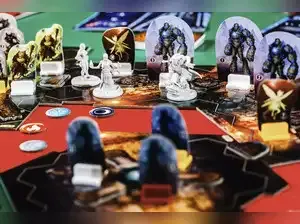Trade volatility has created an existential threat for independent board game publishers in the United States, virtually all of which employ fewer than 10 workers.
Every Monday night, Benjamin Ho and Johann Thiel crowd into a brewery in New York City to play board games. Some weeks, the games transport them to feudal Japan, where they battle for military control of a vast empire. Other nights, they play as Grand Prix drivers or World War I soldiers. They often unwind with a Batman card game.
But now their game nights face disruption from the real world: tariffs imposed by President Donald Trump.
The pair have watched this year as publishers of popular titles have halted production in response to the administration's trade war with China, where most board and card game components are made.
Trade volatility has created an existential threat for independent board game publishers in the United States, virtually all of which employ fewer than 10 workers.
"You don't actually have to have a big operation to design new games, which just keeps things vibrant," said Ho, 36, who owns 90 games. "The tariffs are a step back in allowing people to do that, and I think that really sucks, and I don't want to see the growth of the hobby stunted by this."
At least two prominent publishers -- Greater Than Games, which makes the popular strategy game Spirit Island, and CMON Games, whose titles include Cthulhu: Death May Die and Marvel United -- have curtailed production and cut staff since April. Several others are struggling to bring in orders in time for the all-important holiday season.
At a convention in Columbus, Ohio, in June, about 20% of the game publishers who would typically attend were no-shows because they lacked enough product to sell, said John Stacey, the executive director of the Game Manufacturers Association, a trade group. Those who did attend had fewer games, and shopping was down across the board, he added.
"Some of your favorite companies may not be here in six months making the games," Stacey said.
Eric Price, the president of Japanime Games, which is based in Portland, Oregon, stopped manufacturing new board games about four months ago. It wasn't an easy call. The company's core business is publishing board and card games focused on Japanese anime. But he said he was left with little choice as tariffs on China, the source of most of his materials, whipsawed -- from 34% to 125%, then 145%, before being scaled back to 30%.
Even at that lower rate, he said, he would have to raise the price of a $50 board game to about $80, a hard sell as tariff uncertainty weighs down consumer spending. To make a profit, he's invested more in inexpensive products with higher margins. His card games sell for under $20, and those, along with card sleeves, boxes and binders, can absorb the extra production costs.
"We have completely changed our focus as a company to eliminate several projects we have been working on," Price said. "It's been difficult."
Zach Makowski, 30, usually buys a few games each year at a convention in Philadelphia, where the most popular titles sell out fast. This year, he expects tariffs will make games more expensive.
"A $10 game becoming $15 is a 50% increase, even though it's a $5 bill that you might lose on the subway somewhere," he said.
Publishers often rely on a few popular titles that they sell at a premium to cover most of their expenses, and developing a new game can take years.
Cephalofair Games, which makes strategy board games containing hundreds of bespoke pawns and cards, was forced to leave $1.2 million worth of product at a port in China for about two months when the tariffs first hit, said Price Johnson, the company's chief operating officer. Cephalofair received those delayed shipments in June, and it still needs to import two more games.
The company's most popular games sell for more than $200 each. With added import taxes, that pricing model "falls apart," Johnson said.
"I can't say with any level of confidence that we feel like we can trust what's coming next," he said, adding that many board and card game publishers feel they are among the first victims of Trump's trade war. In May and June, Cephalofair laid off one worker and reduced the hours of two others, said Johnson, who added that he took a 50% pay cut.
Tariff uncertainty kept Gwen Ruelle and Sam Bryant, the owners of the New York City-based board game company Runaway Parade, from placing their usual winter order in the spring. The pair will likely run out of copies of Fire Tower, their flagship game, by the holidays, when they usually bring in three-quarters of their annual revenue.
The tariff landscape is "just going to be pain for all of us," Bryant said. He and Ruelle, he added, have shifted "from being like, 'Oh, this might be our lifetime pursuit,' to 'How long can we possibly keep this going?'"
Ruelle and Johnson said that they had spent months vetting domestic manufacturers, and that at every turn, they have been offered a lower-quality product that would be several times more expensive to produce.
For example, the 135 glimmering orange gems included in each copy of Fire Tower are actually pieces of acrylic plastic, molded in a production process that is second nature for Chinese factories. American manufacturers don't have access to materials that would allow them to make those components at scale, Ruelle said.
Most publishers produce fewer than 10,000 copies of each title. But even if American factories had the materials and the supply-chain sophistication to make the games, the industry's slim profit margins and the variations from title to title present almost insurmountable challenges.
"One board game from the next has entirely different box sizes," Johnson said. "It has different thicknesses of paper, of cards, different treatments on those cards, different cores to the paper."
Large game companies operate at a scale that allows them to more easily navigate a crisis. Hasbro, whose titles include Monopoly and Clue, sources about half its toys and games from China and has accelerated its efforts to move that production elsewhere, executives said during a July earnings call.
Executives from Hasbro and Mattel, whose games include Uno and Pictionary, said in recent earnings calls that they did not expect tariffs to hurt their business as much as they initially expected.
In general, the more complex a game is, the harder it is to create anywhere except China, said Michael Lee, the CEO of Panda Game Manufacturing, which has produced more than 10 million games since it was founded in Vancouver, British Columbia, in 2007. That's especially true for games with many custom plastic components, he said.
As trade tensions ramped up, Panda teamed with a packaging company to move some production to Brazil -- a move the company described on its website as "tariff-friendly."
That kind of investment is risky when trade policies remain unsettled. After that production plan was announced, Trump said that he planned to impose a 50% tariff on Brazilian imports, so Panda will continue to produce most games for American consumers in China, Lee said.
Rather than upending supply chains, some companies have found more modest ways of offsetting tariffs.
Alfred Mai, who owns the San Francisco-based card game company ASM Games, swapped the plastic mold that holds cards in place in each box with a paper one, reducing packaging costs by 20% to 30%, he said.
Still, those hedges won't allow him to circumvent tariffs. Mai said that he planned to absorb a chunk of the added cost to stay competitive.
"It's so erratic," he said of the tariff policy. "One day it's on, one day it's off, and the honest truth is that there is no long-term plan."
Jamey Stegmaier, a founder of Stonemaier Games, which is based in St. Louis, gives customers the option of adding a $3 "tariff-offset gift card" to their orders to help cover the company's increased expenses. Stegmaier expects there to be fewer games on the shelves, and shortages of popular products, as the holidays draw closer.
Supporters of the administration's trade policies say that tariffs are necessary to protect American national security and to promote domestic manufacturing. But as the toy and games industry hedges its bets against Trump's trade brinkmanship, one question has plagued Stegmaier: Is it really a problem that so many games are made in China?
"A ton of these game companies are one-person companies that would not exist if they didn't have the ability to bring their creative idea to life, thanks to this manufacturing capacity in China," he said. "And the creation of one person can result in amazing things for the whole system -- the freight shipping system, the distributors, the retailers."
But now their game nights face disruption from the real world: tariffs imposed by President Donald Trump.
The pair have watched this year as publishers of popular titles have halted production in response to the administration's trade war with China, where most board and card game components are made.
Trade volatility has created an existential threat for independent board game publishers in the United States, virtually all of which employ fewer than 10 workers.
"You don't actually have to have a big operation to design new games, which just keeps things vibrant," said Ho, 36, who owns 90 games. "The tariffs are a step back in allowing people to do that, and I think that really sucks, and I don't want to see the growth of the hobby stunted by this."
At least two prominent publishers -- Greater Than Games, which makes the popular strategy game Spirit Island, and CMON Games, whose titles include Cthulhu: Death May Die and Marvel United -- have curtailed production and cut staff since April. Several others are struggling to bring in orders in time for the all-important holiday season.
At a convention in Columbus, Ohio, in June, about 20% of the game publishers who would typically attend were no-shows because they lacked enough product to sell, said John Stacey, the executive director of the Game Manufacturers Association, a trade group. Those who did attend had fewer games, and shopping was down across the board, he added.
"Some of your favorite companies may not be here in six months making the games," Stacey said.
Eric Price, the president of Japanime Games, which is based in Portland, Oregon, stopped manufacturing new board games about four months ago. It wasn't an easy call. The company's core business is publishing board and card games focused on Japanese anime. But he said he was left with little choice as tariffs on China, the source of most of his materials, whipsawed -- from 34% to 125%, then 145%, before being scaled back to 30%.
Even at that lower rate, he said, he would have to raise the price of a $50 board game to about $80, a hard sell as tariff uncertainty weighs down consumer spending. To make a profit, he's invested more in inexpensive products with higher margins. His card games sell for under $20, and those, along with card sleeves, boxes and binders, can absorb the extra production costs.
"We have completely changed our focus as a company to eliminate several projects we have been working on," Price said. "It's been difficult."
Zach Makowski, 30, usually buys a few games each year at a convention in Philadelphia, where the most popular titles sell out fast. This year, he expects tariffs will make games more expensive.
"A $10 game becoming $15 is a 50% increase, even though it's a $5 bill that you might lose on the subway somewhere," he said.
Publishers often rely on a few popular titles that they sell at a premium to cover most of their expenses, and developing a new game can take years.
Cephalofair Games, which makes strategy board games containing hundreds of bespoke pawns and cards, was forced to leave $1.2 million worth of product at a port in China for about two months when the tariffs first hit, said Price Johnson, the company's chief operating officer. Cephalofair received those delayed shipments in June, and it still needs to import two more games.
The company's most popular games sell for more than $200 each. With added import taxes, that pricing model "falls apart," Johnson said.
"I can't say with any level of confidence that we feel like we can trust what's coming next," he said, adding that many board and card game publishers feel they are among the first victims of Trump's trade war. In May and June, Cephalofair laid off one worker and reduced the hours of two others, said Johnson, who added that he took a 50% pay cut.
Tariff uncertainty kept Gwen Ruelle and Sam Bryant, the owners of the New York City-based board game company Runaway Parade, from placing their usual winter order in the spring. The pair will likely run out of copies of Fire Tower, their flagship game, by the holidays, when they usually bring in three-quarters of their annual revenue.
The tariff landscape is "just going to be pain for all of us," Bryant said. He and Ruelle, he added, have shifted "from being like, 'Oh, this might be our lifetime pursuit,' to 'How long can we possibly keep this going?'"
Ruelle and Johnson said that they had spent months vetting domestic manufacturers, and that at every turn, they have been offered a lower-quality product that would be several times more expensive to produce.
For example, the 135 glimmering orange gems included in each copy of Fire Tower are actually pieces of acrylic plastic, molded in a production process that is second nature for Chinese factories. American manufacturers don't have access to materials that would allow them to make those components at scale, Ruelle said.
Most publishers produce fewer than 10,000 copies of each title. But even if American factories had the materials and the supply-chain sophistication to make the games, the industry's slim profit margins and the variations from title to title present almost insurmountable challenges.
"One board game from the next has entirely different box sizes," Johnson said. "It has different thicknesses of paper, of cards, different treatments on those cards, different cores to the paper."
Large game companies operate at a scale that allows them to more easily navigate a crisis. Hasbro, whose titles include Monopoly and Clue, sources about half its toys and games from China and has accelerated its efforts to move that production elsewhere, executives said during a July earnings call.
Executives from Hasbro and Mattel, whose games include Uno and Pictionary, said in recent earnings calls that they did not expect tariffs to hurt their business as much as they initially expected.
In general, the more complex a game is, the harder it is to create anywhere except China, said Michael Lee, the CEO of Panda Game Manufacturing, which has produced more than 10 million games since it was founded in Vancouver, British Columbia, in 2007. That's especially true for games with many custom plastic components, he said.
As trade tensions ramped up, Panda teamed with a packaging company to move some production to Brazil -- a move the company described on its website as "tariff-friendly."
That kind of investment is risky when trade policies remain unsettled. After that production plan was announced, Trump said that he planned to impose a 50% tariff on Brazilian imports, so Panda will continue to produce most games for American consumers in China, Lee said.
Rather than upending supply chains, some companies have found more modest ways of offsetting tariffs.
Alfred Mai, who owns the San Francisco-based card game company ASM Games, swapped the plastic mold that holds cards in place in each box with a paper one, reducing packaging costs by 20% to 30%, he said.
Still, those hedges won't allow him to circumvent tariffs. Mai said that he planned to absorb a chunk of the added cost to stay competitive.
"It's so erratic," he said of the tariff policy. "One day it's on, one day it's off, and the honest truth is that there is no long-term plan."
Jamey Stegmaier, a founder of Stonemaier Games, which is based in St. Louis, gives customers the option of adding a $3 "tariff-offset gift card" to their orders to help cover the company's increased expenses. Stegmaier expects there to be fewer games on the shelves, and shortages of popular products, as the holidays draw closer.
Supporters of the administration's trade policies say that tariffs are necessary to protect American national security and to promote domestic manufacturing. But as the toy and games industry hedges its bets against Trump's trade brinkmanship, one question has plagued Stegmaier: Is it really a problem that so many games are made in China?
"A ton of these game companies are one-person companies that would not exist if they didn't have the ability to bring their creative idea to life, thanks to this manufacturing capacity in China," he said. "And the creation of one person can result in amazing things for the whole system -- the freight shipping system, the distributors, the retailers."





